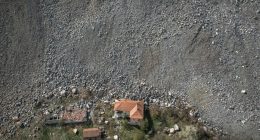Unlock the Editor’s Digest for free
Roula Khalaf, Editor of the FT, selects her favourite stories in this weekly newsletter.
The conversion of former UK military bases and a barge to accommodate asylum seekers has cost £46mn more than using hotels for the same purposes, according to parliament’s spending watchdog.
It would cost the government £1.2bn overall to deliver on its programme to reduce the use of hotels, after the Home Office overshot its original estimates on rehabilitating two sites by nearly eight times, a report by the National Audit Office found.
Gareth Davies, head of the NAO, said the Home Office had made progress in reducing the use of hotels, which by last December was costing taxpayers up to £8mn a day for more than 106,500 people.
“Yet the pace at which the government pursued its plans led to increased risks, and it now expects large sites to cost more than using hotel accommodation,” he said.
He added that the Home Office “continued this programme despite repeated external and internal assessments that it could not be delivered as planned”.
When sunk-costs are included, the Home Office now estimates that the use of four operational sites to accommodate asylum seekers will cost “approximately £46mn” more than using hotels, the NAO said.
The government originally estimated the cost of rehabilitating two former military bases to house asylum seekers, RAF Wethersfield in Essex, and RAF Scampton in Lincolnshire, at £5mn each.
However, expenditure has since increased to £49mn for Wethersfield and £29mn for Scampton, according to findings published by the public spending watchdog on Wednesday.
Two of four large sites, the Bibby Stockholm barge and RAF Wethersfield, were at the end of January housing under half the number of people the Home Office originally expected, the watchdog added.
The Home Office said the NAO figures included set-up costs and that it was now “better value for money” to continue using the sites it has converted.
“We have always been clear that the use of asylum hotels is unacceptable, and that’s why we acted swiftly to reduce the impact on local communities by moving asylum seekers on to barges and former military sites,” it added.

The NAO findings came as UK Prime Minister Rishi Sunak’s flagship Rwanda bill returned for the second time on Wednesday to the House of Lords.
Sunak is hoping that swift passage of the legislation, which seeks to head off legal challenges to his plans for removing asylum seekers to Rwanda, will allow the flights to take off this summer. But Labour peers are expected to reinsert amendments that could delay implementation.
The NAO findings also coincided with a separate report that underscored the waste in human capital resulting from the government’s record in managing the asylum system.
The report by the Commission on Integration of Refugees, an independent cross-party and interfaith group, used economic modelling developed by the London School of Economics.
It found the asylum system “is now creaking under the weight of a historically large backlog of cases”. If just two of the commission’s recommendations were implemented refugees would contribute £1.2bn in net benefits to the UK economy after five years, it said.
The report’s recommendations included meeting government targets to process all asylum claims within six months of an application being made, and providing English classes and employment support during that period.
Read More: World News | Entertainment News | Celeb News
FT









